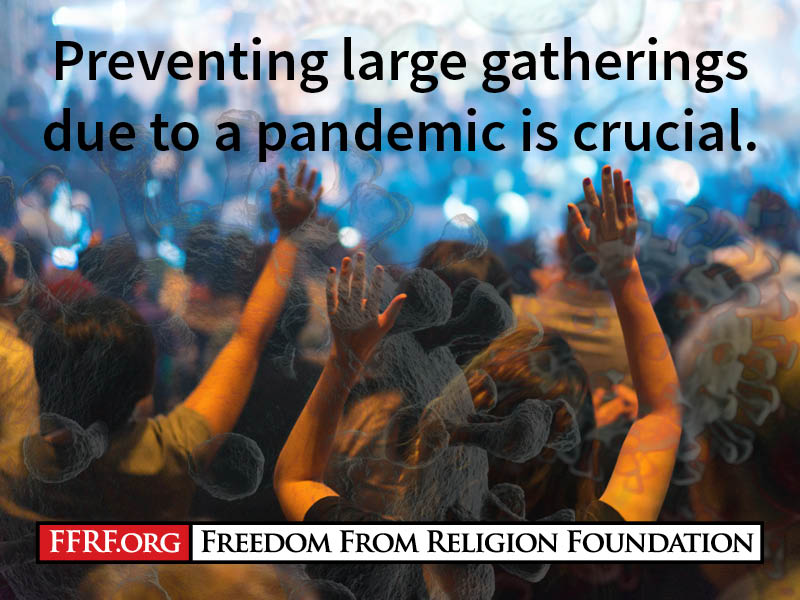
The Freedom From Religion Foundation is cautioning 17 governors around the nation that the exemptions they’ve granted to religious gatherings from prohibitory orders could have dire consequences.
States all over the country, from Connecticut and Pennsylvania to New Mexico and Colorado, have exempted religious congregations of various sizes from coronavirus-related crowd regulations. Of these, Michigan, New Mexico, Pennsylvania, South Carolina, West Virginia, Colorado, Georgia and Tennessee glaringly have no formal limits, while Connecticut is allowing congregations of fewer than 50 people, Oregon of fewer than 25 and Alabama, Indiana, Missouri and North Carolina of fewer than 10 individuals. FFRF has sent a letter to the governors of all these states. (Florida, Wisconsin and Kansas also have such exemptions, and FFRF has previously written to these governors.)
Religious gatherings are a severe community health hazard, FFRF emphasizes. The data doesn’t lie. One-third of all COVID cases in one large California county can be traced to church services. The numbers are even greater elsewhere. Reuters reports: “South Korea announced thousands of coronavirus cases in the space of only a few days in late February. The surge in cases centered mostly around one main cluster from a church in Daegu city.” Even small gatherings can be deadly. Health officials in Lee County, Ala., have informed the media that “church gatherings have been tied to a swell in new cases across the area, explaining that even groups smaller than 10 people can spread the coronavirus.”
The gubernatorial exemption directives are seriously flawed, FFRF contends, offering several reasons.
First, religious freedom does not require exempting churches from these orders, the organization insists.
“Americans have rights to worship and to assemble, but neither of those rights is unlimited and neither includes the right to risk other people’s lives,” FFRF Co-Presidents Dan Barker and Annie Laurie Gaylor write to more than a dozen governors.
States already regularly limit worship gatherings that jeopardize public health, FFRF points out. For instance, the government already imposed fire and other building codes on churches. Preventing large gatherings due to a pandemic is even more crucial. And prohibiting such assemblies is not a ban on worship any more than speed limits are a ban on driving. The short-term ban is guided by science: The more people who gather, the more viruses spread.
More than 100 years ago, the U.S. Supreme Court explained in a 7-2 opinion that society’s interest in stopping the spread of smallpox was greater than an individual’s religious rights, FFRF adds. And the court has reiterated this again and again.
Second, FFRF maintains, such exemptions unconstitutionally favor churches. Courts have long ruled that the Establishment Clause of the First Amendment bars the government from preferring one religion over another, or religion over nonreligion. The exemption for church services violates the First Amendment.
Third, such exemptions are immoral and deadly, FFRF avers. Clerics seeking exemption from social-distancing orders are not simply asking for a right to gather and worship, they are also asking for a right to threaten the lives of every other member of the community. These churches are also overburdening the health care system. Doctors are already working overtime and rationing beds and ventilators. Churches that hold services are contemptuously disregarding the efforts of these heroes.
It is hard to imagine a clearer need for prohibiting church services and gatherings than a highly infectious global pandemic. FFRF urges these governors to safeguard state citizens by revising the stay-at-home orders to remove unconstitutional and ill-advised exemptions for religious gatherings.
The Freedom From Religion Foundation is a national nonprofit organization with over 31,000 members across the country, including in every state. It works to protect the constitutional separation between state and church and educates about nontheism.

